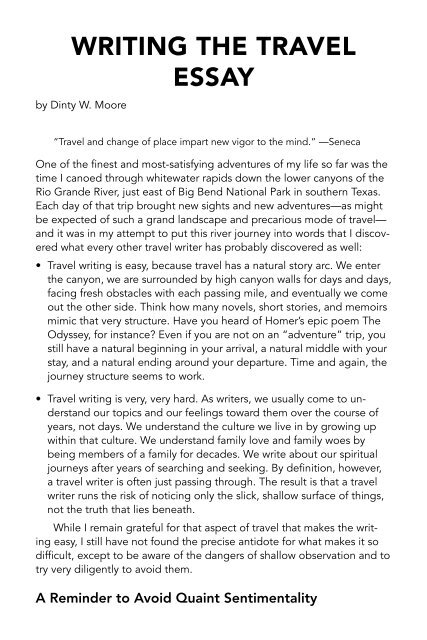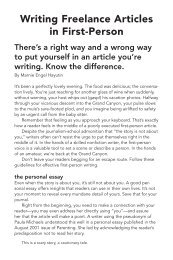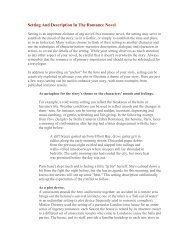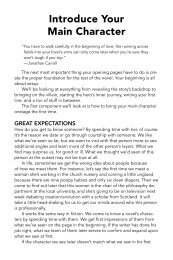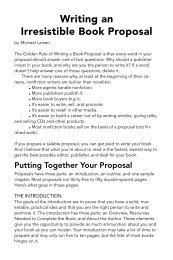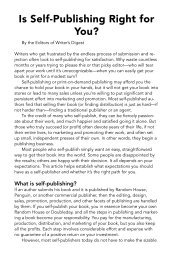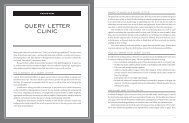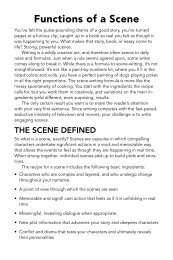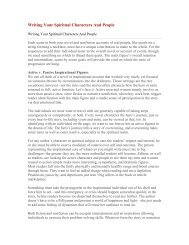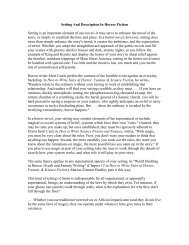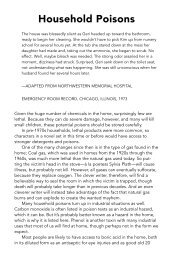WRITING THE TRAVEL ESSAY - Writer's Digest
WRITING THE TRAVEL ESSAY - Writer's Digest
WRITING THE TRAVEL ESSAY - Writer's Digest
Create successful ePaper yourself
Turn your PDF publications into a flip-book with our unique Google optimized e-Paper software.
<strong>WRITING</strong> <strong>THE</strong> <strong>TRAVEL</strong><br />
<strong>ESSAY</strong><br />
by Dinty W. Moore<br />
“Travel and change of place impart new vigor to the mind.” —Seneca<br />
One of the finest and most-satisfying adventures of my life so far was the<br />
time I canoed through whitewater rapids down the lower canyons of the<br />
Rio Grande River, just east of Big Bend National Park in southern Texas.<br />
Each day of that trip brought new sights and new adventures—as might<br />
be expected of such a grand landscape and precarious mode of travel—<br />
and it was in my attempt to put this river journey into words that I discovered<br />
what every other travel writer has probably discovered as well:<br />
• Travel writing is easy, because travel has a natural story arc. We enter<br />
the canyon, we are surrounded by high canyon walls for days and days,<br />
facing fresh obstacles with each passing mile, and eventually we come<br />
out the other side. Think how many novels, short stories, and memoirs<br />
mimic that very structure. Have you heard of Homer’s epic poem The<br />
Odyssey, for instance? Even if you are not on an “adventure” trip, you<br />
still have a natural beginning in your arrival, a natural middle with your<br />
stay, and a natural ending around your departure. Time and again, the<br />
journey structure seems to work.<br />
• Travel writing is very, very hard. As writers, we usually come to understand<br />
our topics and our feelings toward them over the course of<br />
years, not days. We understand the culture we live in by growing up<br />
within that culture. We understand family love and family woes by<br />
being members of a family for decades. We write about our spiritual<br />
journeys after years of searching and seeking. By definition, however,<br />
a travel writer is often just passing through. The result is that a travel<br />
writer runs the risk of noticing only the slick, shallow surface of things,<br />
not the truth that lies beneath.<br />
While I remain grateful for that aspect of travel that makes the writing<br />
easy, I still have not found the precise antidote for what makes it so<br />
difficult, except to be aware of the dangers of shallow observation and to<br />
try very diligently to avoid them.<br />
A Reminder to Avoid Quaint Sentimentality
Though I understand where the notion comes from, I must admit my frustration<br />
with travel essays that reveal little more than “I went to this exotic<br />
location and boy was it ever different!”<br />
Well, of course it was different!<br />
Foreign lands are different, the food is unusual (to you), and the<br />
unfamiliar customs are sometimes charming. Though there remains<br />
something exhilarating about discovering these delightful differences<br />
firsthand, there is nothing new in the discovery.<br />
So, just as you should avoid being the ignorant visitor, the one who<br />
insists that foreign lands should be “just like home,” with all of the familiar<br />
comforts and menu items, avoid as well the tendency to over-romanticize.<br />
The indigenous woman selling handcrafted souvenirs in the village<br />
square is charming and evocative maybe, but she is also a person, with<br />
children and grandchildren, perhaps a stack of debt and worries back<br />
home, and maybe even some arthritis in her knees. Don’t make the mistake<br />
of assuming her life is simple, easier, or less stressful than your own.<br />
When travelling, try to see what is really there, not what past travel<br />
articles—many of them riddled with clichés—tell you will be there.<br />
Three Quick Tips<br />
• Read as much as you can about your destination before you arrive,<br />
and don’t just read the guidebooks. Read up on the region’s history<br />
and economy, explore the cooking and agriculture, and try to understand<br />
religious observances. This way, if you see something unfamiliar<br />
or peculiar, you’ll have a better chance of understanding the reasoning<br />
behind the custom.<br />
• Newspaper travel sections often reduce travel writing to a list of hotels<br />
and tourist-friendly restaurants. These articles can be useful, certainly,<br />
to first-time travelers, but as an essayist, remember that you are digging<br />
for deeper treasure, looking for meaning in an experience, not<br />
just bargains.<br />
• There is a difference between a travel writer and a tourist. A tourist is<br />
on vacation; a travel writer is on a pursuit.<br />
Your Travel Essay<br />
Try some of the following prompts to get your travel essay wheels turning:<br />
1. You needn’t go overseas. If you live in the city, go to the country<br />
and attend an antique farm equipment auction or learn to make goat
cheese. If you live in the country, spend a long weekend in Chicago or<br />
New York City.<br />
2. But if you do the latter, don’t try to “cover” the whole city in three<br />
days. All you will have then is a list of destinations. Instead, pick an obscure<br />
neighborhood, eight square blocks, and really get to know the<br />
area up close.<br />
3. Add people to your story. If you speak the language of the area<br />
you are visiting, that’s a great advantage, but if you do not, find someone<br />
local who speaks English. Buy them coffee or lunch and ask them<br />
questions. Most people are flattered and eager to talk about the place<br />
where they live.<br />
4. Travel writer Pico Iyer, author of The Global Soul: Jet Lag, Shopping<br />
Malls, and the Search for Home, advises skipping the normal<br />
attractions. He seeks out the “… new, absolutely contemporary, and<br />
constantly shifting wonders of the modern world.” For example, in his<br />
often-anthologized essays, Iyer chronicles airport culture instead of<br />
cathedrals and explores the world’s largest Kentucky Fried Chicken,<br />
found just off Tiananmen Square, near the Mao Tse-tung mausoleum.<br />
In other words, don’t try to capture what you can see on every tourist<br />
postcard. If it is on the postcards, it is already a cliché.<br />
5. Not all travel is uplifting and life-affirming. Were you pick-pocketed?<br />
Write about it. Do you suspect the cabdrivers of inflating their<br />
prices? Well, write about that and how it makes you feel.<br />
6. Fly to Paris, Berlin, Mexico City, or Minneapolis. After a good<br />
lunch and a revitalizing nap, take out a map of the area—maybe large<br />
enough to cover a 50-mile-radius. Now close your eyes and point.<br />
Find a way to get to wherever your finger landed, write about how you<br />
got there and the surprises along the way.<br />
7. When you find yourself in a location where the cuisine seems<br />
very exotic, seek out cooking classes. Or offer the cook in your hotel a<br />
small tip to at least let you observe.<br />
8. In lieu of the grand, “written-about-two-thousand-times-eachyear”<br />
medieval cathedral, seek out the small place of worship that no<br />
one visits except the people who actually live and pray there.<br />
9. Bring yourself into the travel, and the travel essay. If you are a<br />
sixty-year-old, recently widowed woman who spent her life farming<br />
and raising dairy cows, your response to the French countryside<br />
should reflect that, and thus be very different from a response written<br />
by a twenty-five-year-old elementary school teacher.<br />
10. Be enthusiastic and curious. It will make your travel more interesting<br />
and will always show through in the writing.


